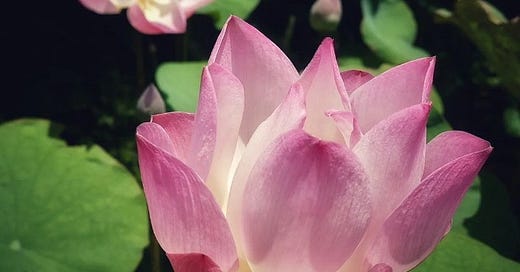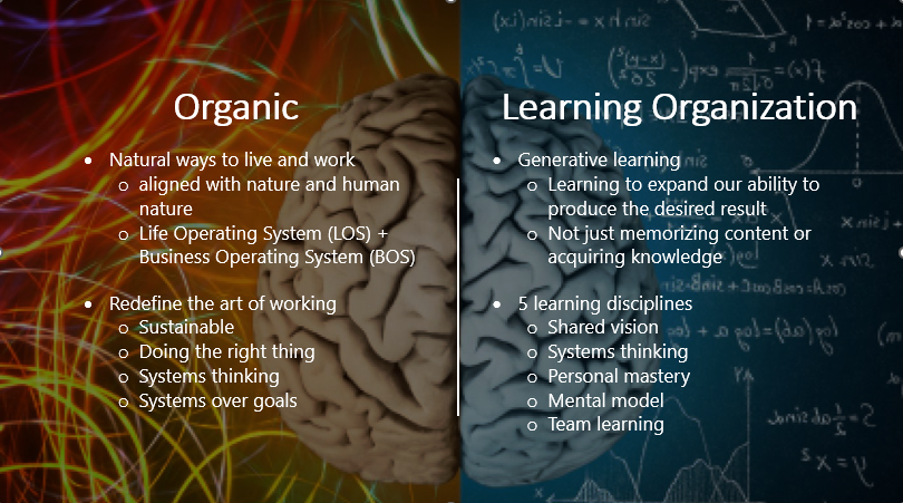I set a 10-year moonshot for V-Work to transform our company into an Organic Learning Organization. This was inspired by Peter Senge’s book The Fifth Discipline, which introduced the five disciplines of a learning organization (refer to the OLO in the section below).
I am finding a new purpose in practicing Organic Learning in my personal life. One of the main reasons for the existence of Bear Path public journal is to use years ahead to share this practice in real life. Organic learning is having the curiosity to learn, and the courage to fail. Fail-fast, fail-forward.
Why organic learning?
The mental models of modern society, organizations, and people have been shifted by capitalism and the advancement of technologies. We have evolved from small tribes of 10+ people to a city dwelling with millions of residents. We invented personal assets and business corporations, but we are getting further away from the true self and living harmoniously with nature.
While human beings excel in living standards by disrupting our technologies, our nature is also disrupted almost beyond repair.
During the era of hunter-gathering and farming, we worked with seasons of time and learned to be patient. We gravitated toward instant gratification and instant success. Students sacrificed sleep before the final exam, hoping to get a different alphabet on their score instead of taking care of the body, which boosts better cognitive power. We are becoming more short-sighted.
Transitioning from the industrial age to the artificial intelligence (AI) era, we are applying less critical thinking to daily events. In 2023, we are entering another new era of information search with ChatGPT from OpenAI (backed by Microsoft), so the new Bing is overtaking Google ‘god’ as the preferred search engine. With generative AI, even our creativity may be ‘outsourced’.
We seek the latest, the best, and the trendy. We want more. This trend has created ‘disposable’ merchandise with a high resource waste.
Society encourages us to compete; we celebrate winners. The zero-sum game started with home education, schooling, and even the workplace.
Schools and workplaces have assembly-line factory production management that treats everyone the same. If the zoo is a class, we expect the monkey to score A, the same as the duck or fly, like the eagle. Even modern medicine uses average statistics to treat the individual, but we are all different entities; we are unique individuals.
Traditional schooling trains us to have one correct answer for every quiz. We are embarrassed if we don’t know the ‘right’ answer and discouraged from asking ‘dumb’ questions. Our innate nature to learn and the curiosity of the newborn child has been transformed into a 'correct’ answer-seeking culture. We are shy to say we don’t know, embarrassed to read another book after graduation, or embarrassed to ask for help.
Work and home are two separate worlds. We need to strike for work-life balance. How many people can focus on work while your child is critically ill at home? Who can sleep well early when you have an overdue task in the office due by midnight?
At the rate that we are going, it is not sustainable. People experience burnout. Human ignorance and greed destroy nature. Today's smartphone is more powerful than the computing power of the space shuttle, sending people to the moon. The information at our fingertips can rival any public library with millions of books. An average family has modern amenities that are more comfortable than the medieval king. Are we happier or ‘better’ in every aspect of our current mental models and culture?
These may seem pessimistic and gloomy. Organic Learning is my approach to seeing events with better clarity and a path to living among the chaos. Starting with self-responsibility as individual ownership, I believe it makes a positive impact and makes a difference.
What is organic learning?
Organic is an ‘adjective’ to describe a natural, sustainable, and holistic approach.
Natural - less processing or interference, simplicity, common sense
Sustainable - minimal or no wastage of resources, essentialism
Holistic - systems thinking, viewing events and objects as sophisticated web, not linear cause-effect
Organic learning is a lifelong quest to seek the truth, knowing that our knowledge is only a fragment of the complex truth and applying workable know-how for the greater good. Sometimes, the best solution is to remove the interferences (无为).
“Stay hungry. Stay foolish.” - Steve Jobs
Be patient. Our company (V-Work) is embarking on a 10-year journey to learn and practice as an Organic Learning Organization (OLO). I plan to elaborate on OLO through daily events and learning in this public journal (Bear Path). Do join my journey if you are interested. I hope you can be my mentor and guide, too.
What is Organic Learning Organization (OLO)?
[credit to Sin Ye who creates a lot of useful infographics]
This is a framework adopted by V-Work. It is composed of many sub-systems and frameworks:
Life Operating System (LOS)
Mastery
Interactions
Connectedness
Co-existence (Collaboration and Competition)
Operating Model (AIDS)
Business Operating Systems (BOS)
People
right people
right seat
Disciplines
Principles
Practices
Tools
Knowhows
Technologies
5 disciplines of Learning Organization (The 5th Discipline by Peter Senge)
Personal Mastery
Mental Model
Shared Vision
Systems Thinking
Team Learning
[image credit from Wikipedia]
I will elaborate on these key concepts (or subtopics)in the sequence journals. We are fanatics about systems. Each bullet point or element above can form a subsystem (concept) with another element; hence, it is a web of tools.
What OLO is not?
Organic is not about ‘organic farming’ but has parallels. My role is the Chief Gardener so that we can learn many things from organic agriculture. We believe that learning is a natural behavior in most advanced life forms.
It is not about ‘work-life balance’. We believe dynamic equilibrium is a natural phenomenon, not a static balance. When it comes to learning, there is no distinction between personal and professional life. How you do anything is how you do everything. So, Organic Learning applies to a holistic life, not segregated by work or home, business skills, or personal development.
Organic Learning does not preach to impose an ideal on others. We serve others by showing up as a model (example), practicing independently, and taking on self-responsibility. Organic Learning is not about right or wrong. It is not a fixed dot but a spectrum (continuum) of truth. There is more than one answer, each for a different scenario and a different set of stakeholders.
Organic Learning is not a ‘solution’ to changing the world but to giving individuals peace of mind, the purpose of serving and making positive impacts, the progress of self-growth, separating suffering from pain, having pleasure in little things (小确幸), and passion in exploring and learning. I called this the 6Ps of happiness.
Organic Learning is not memorizing facts or formulas to get a good grade on a one-paper-fits-all examination. Life is a test, but everyone gets a different exam paper. Organic Learning is seeking the truth and trying our best to have clarity over a respectful sophistication of the matter, learning to identify the effective leverage points, and being patient for the compounding growth.
Organic Learning Organization (OLO) is not a destination or a certification. It is a culture of coaching and learning, it is a practice of seeking the truth (clarity), it is team learning at the organization scale.
This Bear Path public journal is dedicated to sharing weekly living and working learnings related to OLO. Feel free to subscribe to this email newsletter to get future posts or share with those interested in lifelong learning.






